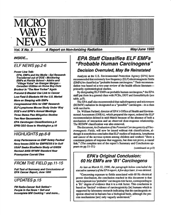News & Comment
An Expert on Exposure Assessment, He Never Gave Up

Wednesday, August 1, 2018
“The Nation” Resurrects an Old Controversy

Monday, May 7, 2018
Last updated July 16, 2018
Why Peer Review Panel and NTP Interpreted the Same Animal Data Differently

Monday, April 9, 2018
Last updated February 15, 2023
Rate of GBM More Than Doubled Between 1995 and 2015

Sunday, March 25, 2018
Last updated June 25, 2018
Ramazzini’s Belpoggi Calls for IARC To Reassess RF–Cancer Risk

Thursday, March 22, 2018

